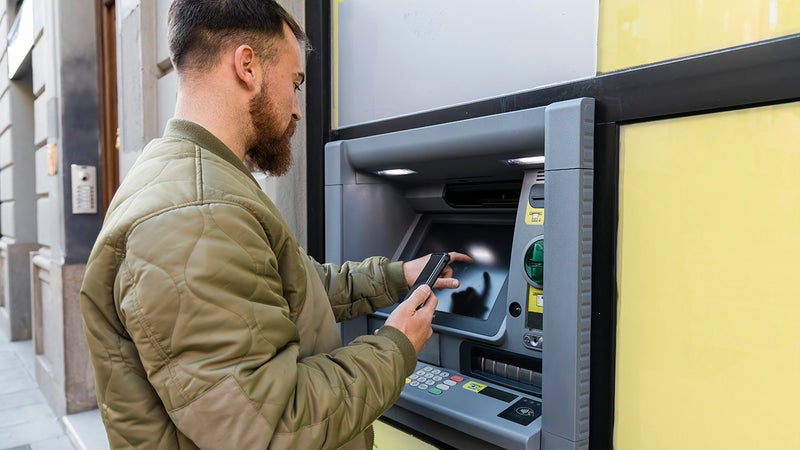10 types of checking accounts

The Bankrate promise
At Bankrate we strive to help you make smarter financial decisions. While we adhere to strict , this post may contain references to products from our partners. Here's an explanation for .
Checking accounts are a household money management staple, allowing you to pay bills and make purchases through electronic transfers, paper checks and debit cards.
Consumers usually keep their checking accounts for a long time. The average U.S. checking customer has been with their bank for about 17 years, according to a 2022 Bankrate survey.
The best checking accounts either don’t have monthly fees or allow you to easily avoid these fees by meeting certain requirements. Many of the best checking accounts also have ways to avoid out-of-network ATM fees, or even to get free checks.
Key takeaways
- Different types of checking accounts can offer different perks such as free checks, money orders, safe deposit boxes, ATM fee reimbursements and overdraft forgiveness.
- Rewards checking accounts enable customers to earn points or cash back when making purchases with their debit card.
- Second-chance checking accounts are available for those who have been denied a standard checking account due to a history of excessive overdrafts or unpaid negative balances.
Types of checking accounts
These are some of the most widely available types of checking accounts offered at banks and credit unions.
Traditional checking account
These normally offer checks, a debit or ATM card and online bill pay options. Often you can waive a monthly maintenance fee by maintaining a minimum balance, while some traditional checking accounts don’t charge such a fee at all.
These accounts may also offer overdraft protection to cover payments beyond your account’s available balance, though such services often come with a fee.
- Who it’s best for: Anyone seeking an account to use for paying bills and making debit card transactions
- Common key features: Checks, a debit card, online bill payment
Premium checking account
This account typically offers perks that you’d otherwise have to pay for. These may include a free safe deposit box, free personal checks, free official checks, free money orders and fees waived on some or all out-of-network ATMs. You’ll usually need to maintain a higher minimum balance on a premium account.
- Who it’s best for: Customers with a high account balance
- Common key features: Free checks, money orders and safe deposit box, waived out-of-network ATM use
Student checking account
These accounts are usually for students ages 18-23. Student checking accounts might not have maintenance fees for those who qualify. They may also offer overdraft forgiveness, ATM fee reimbursement, free checks or other perks. These accounts can be a useful way for students to begin managing their money, using their own debit card for purchases or cash withdrawals.
It’s important to note that while a student checking account might be a great fit for some people, if it doesn’t reimburse ATM fees, there may be a better option for you. A bank that allows you to use out-of-network ATMs without incurring a fee should be considered — even if the checking account doesn’t have “student” in its name.
- Who it’s best for: Students between the ages of 18 and 23
- Common key features: Overdraft forgiveness, ATM fee reimbursement, free checks
Senior checking account
These accounts are typically available to people ages 55 or 60 and older. They may offer free checks, waived monthly maintenance fees and other perks beneficial to those who are retired or living on a fixed income.
However, don’t just look at the account name and assume it’s the right account for you without shopping around. You may find a better deal with an account that isn’t marketed to seniors.
- Who it’s best for: Those around 55 years of age and older
- Common key features: Free checks, waived monthly maintenance fees
Interest-bearing account
Interest-bearing checking accounts help you earn interest. Some of these may have specific requirements to earn a certain APY, such as having a minimum direct deposit or a minimum number of debit card transactions.
There may also be limitations on how much of your balance earns a certain APY. While some interest checking accounts offer higher APYs than savings or money market accounts, interest-checking accounts are more likely to only pay a higher APY on funds up to a certain balance threshold, with additional funds earning a lower rate.
Other interest-checking accounts will only give you a fraction of the yield you can get on a top-yielding savings account. For instance, a checking account may pay a 0.1 percent APY, whereas the top savings accounts currently pay upwards of 5 percent APY.
- Who it’s best for: Those who maintain a large checking account balance
- Common key features: Pays interest on the balance
Business checking account
This type of checking account can help a business run. For instance, a business may have one checking account for payroll and another for operating expenses. It also could have other accounts for specific purposes.
Business checking accounts may charge customers extra for transactions surpassing a certain number. If your business makes regular cash deposits, consider these charges carefully when comparing business checking accounts.
- Who it’s best for: Those who run a business
- Common key features: Business checks, ability to accept credit and debit card payments
Checkless checking account
These accounts don’t offer checks, so you’ll need to rely on using a debit card to make transactions. This type of account might not have overdraft fees. If you can’t remember the last time you’ve written a check, this might be a desirable banking option for you. Some checkless checking accounts charge a monthly maintenance fee that cannot be waived.
- Who it’s best for: Anyone who doesn’t need to write paper checks
- Common key features: Debit card, online bill pay
Rewards checking account
Earning points or cash back is possible with a rewards checking account when you make purchases with your debit card. Make sure you look at the fine print to see if you need to meet certain requirements to earn cash back. Other factors to consider include required minimum balance, maintenance fees and whether there’s a cap on the amount of cash back or number of points that can be earned.
- Who it’s best for: Those who make frequent debit card purchases
- Common key features: Cash back or points on debit purchases
Private bank checking account
You’ll usually need to have a certain amount of money deposited at a bank to be eligible for a private bank checking account. Investments and lending relationships may be considered to meet this threshold.
This type of account may give you higher debit card limits, free wire transfers, higher Zelle limits or the ability to withdraw more in a day from an ATM. You may also work with a dedicated representative who handles your account.
- Who it’s best for: Those who can meet high minimum balance requirements
- Common key features: Access to a private banker, higher rates on deposit products, lower rates on loans, free checks, free safe deposit box
Second-chance checking account
Those denied a standard checking account due to a history of excessive overdrafts or unpaid negative balances should consider second-chance checking. These accounts help you start over and maintain good standing with a bank.
Second-chance checking accounts typically do not offer all of the services as standard accounts. Monthly service fees might be mandatory, and overdraft protection might not be an option. The bank may eventually allow you to convert to a regular checking account if you’ve kept this one in good standing for a certain period of time.
- Who it’s best for: Consumers who have been denied standard checking
- Common key features: Mandatory service fees, no overdraft protection
How to choose the right checking account
Whatever your situation, chances are there’s a checking account that aligns well with your needs. When choosing a checking account, determine which factors are important to you. For some people, fees (and how to avoid them) are a top priority. Other things to be considered are the availability of branches and ATMs and whether a minimum balance is required.
Bottom line
Checking accounts are an essential part of managing your finances. Fortunately, there are a variety of options available to meet your needs. Consider factors such as fees, availability of branches and ATMs and minimum balance requirements when selecting the right checking account for you. With a little research, you can find the one that best suits your lifestyle and financial goals.





